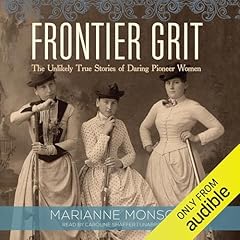
By the Rivers of Water
A Nineteenth-Century Atlantic Odyssey
No se pudo agregar al carrito
Add to Cart failed.
Error al Agregar a Lista de Deseos.
Error al eliminar de la lista de deseos.
Error al añadir a tu biblioteca
Error al seguir el podcast
Error al dejar de seguir el podcast
 Exclusivo para miembros Prime: ¿Nuevo en Audible? Obtén 2 audiolibros gratis con tu prueba.
Exclusivo para miembros Prime: ¿Nuevo en Audible? Obtén 2 audiolibros gratis con tu prueba.Compra ahora por $24.94
-
Narrado por:
-
Mirron Willis
-
De:
-
Erskine Clarke
In early November 1834, an aristocratic young couple from Savannah and South Carolina sailed from New York and began a seventeen-year odyssey in West Africa. Leighton and Jane Wilson sailed along what was for them an exotic coastline, visited cities and villages, and sometimes ventured up great rivers and followed ancient paths. Along the way they encountered not only many diverse landscapes, peoples, and cultures but also many individuals on their own odysseys—including Paul Sansay, a former slave from Savannah; Mworeh Mah, a brilliant Grebo leader, and his beautiful daughter, Mary Clealand; and the wise and humorous Toko in Gabon. Leighton and Jane Wilson had freed their inherited slaves and were to become the most influential American missionaries in West Africa during the first half of the nineteenth century. While Jane established schools, Leighton fought the international slave trade and the imperialism of colonization. He translated portions of the Bible into Grebo and Mpongwe and thereby helped tolay the foundation for the emergence of an indigenous African Christianity.
The Wilsons returned to New York because of ill health, but their odyssey was not over. Living in the booming American metropolis, the Wilsons welcomed into their handsome home visitors from around the world as they worked for the rapidly expanding Protestant mission movement. As the Civil War approached, however, they heard the siren voice of their Southern homeland calling from deep within their memories. They sought to resist its seductions, but the call became more insistent and, finally, irresistible. In spite of their years of fighting slavery, they gave themselves to a history and a people committed to maintaining slavery and its deep oppression—both an act of deep love for a place and people and the desertion of a moral vision.
A sweeping transatlantic story of good intentions and bitter consequences, By the Rivers of Water reveals two distant worlds linked by deep faiths.
©2013 Erskine Clark (P)2013 AudioGOLos oyentes también disfrutaron:




















freed American slaves return to Africa
Se ha producido un error. Vuelve a intentarlo dentro de unos minutos.
Where does By the Rivers of Water rank among all the audiobooks you’ve listened to so far?
I listened to this book twice back to back: but it was the story rather than the narration that held me. I think it was the most interesting and thought provoking book I read in 2014.What was one of the most memorable moments of By the Rivers of Water?
The whole book was memorable-every page was a learning experience for me.What about Mirron Willis’s performance did you like?
I wasn't crazy about his performance to begin with but it grew on me.Was there a moment in the book that particularly moved you?
The missionaries' move to Gabon introduced me to a period of West African history of which I was completely unaware.Any additional comments?
I would recommend this book to anyone who has an interest in the history of Protestant missions, of slavery in the American South, or of the colonial history of West Africa.Fascinating
Se ha producido un error. Vuelve a intentarlo dentro de unos minutos.


